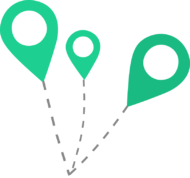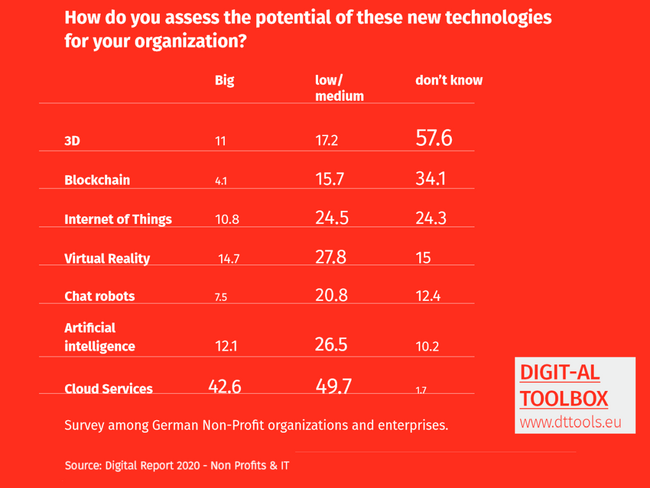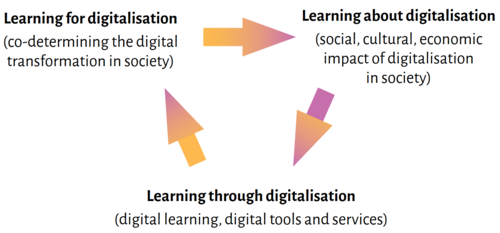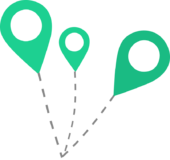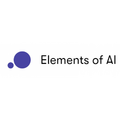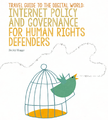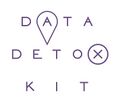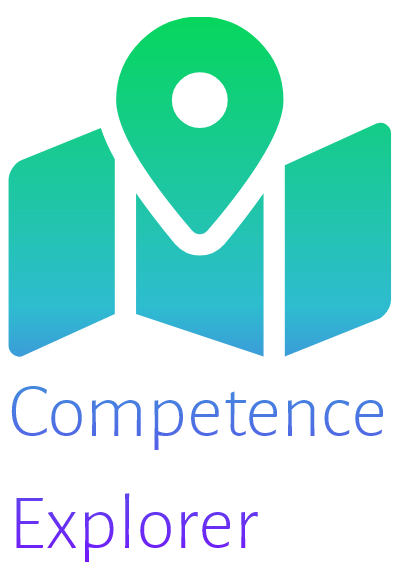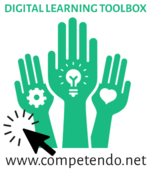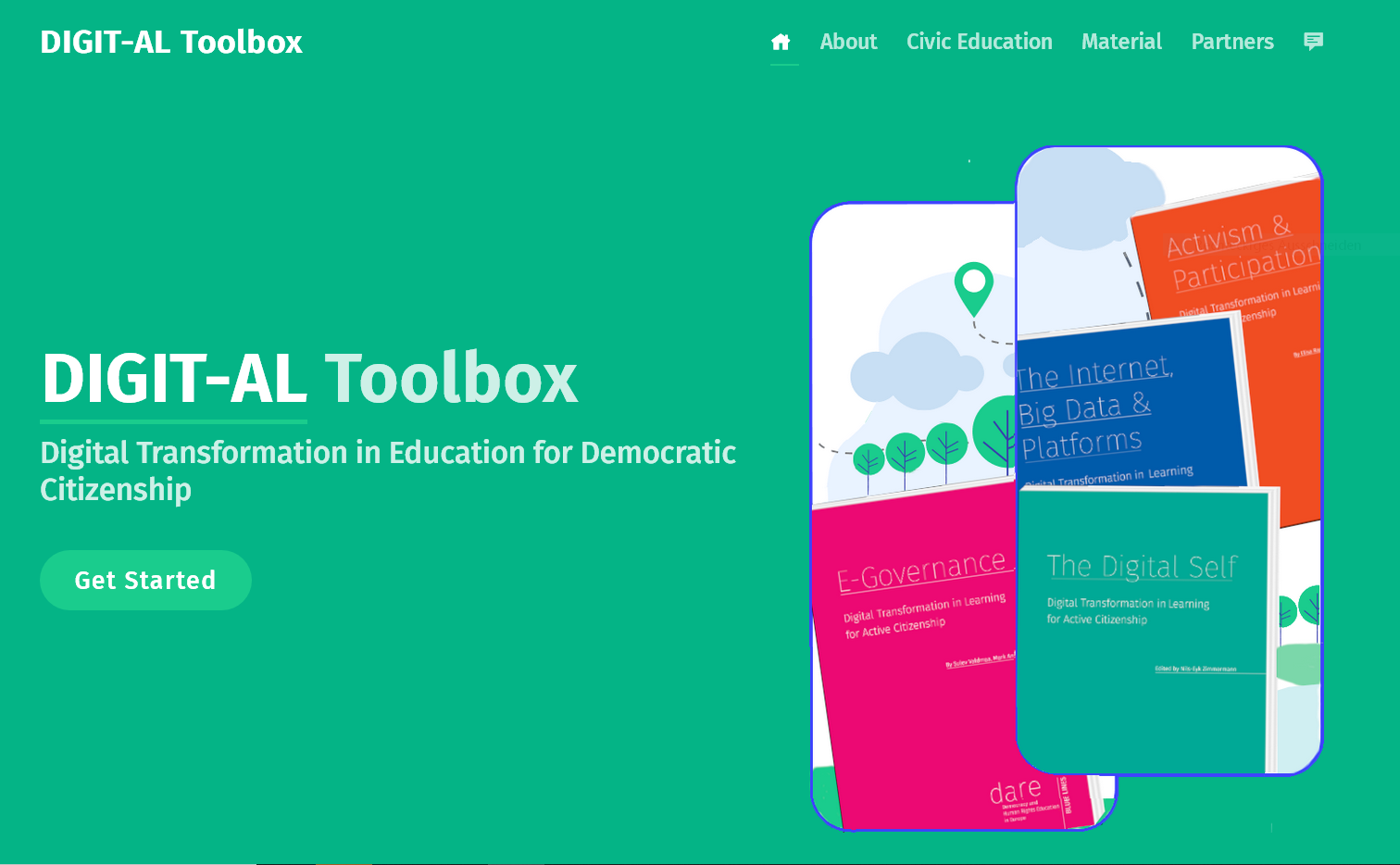There is a lively debate among practitioners using digital tools in education over the innovative contribution of digital education to pedagogy. Learning processes might be qualitatively poor despite integrating technology – just think of all the boring PowerPoint presentations you’ve sat through in your life. On the other hand, educational processes designed without using new technology might also be experienced as insightful, innovative and helpful.
Digitalisation in Education and Training
As our society becomes more digital, digital processes and tools have found their way into the planning, organization and implementation of learning processes, in international cooperation in particular long before COVID-19. But today, we need to think about digitalisation in a new way. Learning analytics, artificial intelligence, new ways of recognizing learning outcomes and developments are all up for debate.
New aspects and challenges
- Professional competence of educators: in which fields do educators need to learn and to develop?
- Tracking, measurement, assessment in learning processes: how can educators and educational organisations use, manage and control this technology?
- Other applications of AI in learning processes: how can educators and learning organisations create new learning opportunities by using AI?
- Control and governance of algorithms, including the ability to interprete data correctly
- Digitally supported recognition and micro-credentialing: how can these support individual competence recognition and description
- Individual learning accounts
- Platforms, clouds, infrastructure: how can organisations shift from a user perspective toward conscious creation of digitally supported, rights-sensitive and robust learning environments?
- Exploring and integrating the opportunities of making and computer-aided design (3D print, plotting, and others...)
Here, too, a rights- and values-centered approach offers a different perspective than that shared, for example, by large market players: emphasis on user rights and control, supporting free and open software, forms of sharing and open licenses - and therefore supporting a diverse and competitive Internet ecosystem.
Democracy-related education means taking its subject seriously, even in its means, while at the same time being open to the new and to its own modernization. Instead complaining that such open ad sensitive tools are not working, the sector must strengthen efforts to make them work and implement them.
Holistic Learning 'the Digital'
When media and technology are tools like didactic approaches are, then also the question regarding the intended socio-political goals is important. Education needs to explore here the digital transformation from a meta-perspective. The learning "about" digitalisation becomes relevant. From an active citizenship and participation perspective we need to draw attention also to "for" what kind of digital transformation I am pleading:
Media & Data: Games and Interactive Tools
Play and learn.
Are you you?
Interactive documentary and challenge: Beat face recognition systems by Tijmen Schep and Sherpa project
OnlineBad News
Online game - From fake news to chaos!
play onlineDisinformation Diaries
Learn how disinformation interferes with elections
play onlineFake it to make it
A game about fake news
play onlineOnline test: filter bubble
interactive introduction by Zentrum fir politesch Bildung (ZpB) Luxemburg
OnlineHarmony Square
Game about fake news
play onlineHow normal am I?
How normal am I? By Tijmen Schep. play onlineTest: Human vs. AI
Can We Tell the Difference Anymore? play onlineYour Data Mirror
Learn about the mechanisms of data collection and the impact this practice on society. By Interactive Media Foundation.
onlineWeek with Wanda
A game about the impact of Artificial Intelligence
play online
Digitalisation: Digital & Media Competence
Explore more materials and handbooks:
Digital Citizenship Education Handbook
by Council of Europe. Being online. Well-being online. Rights online
DownloadLearning the Digital
Competendo handbook
moreBookmarks
CoE's manual for combating hate speech through human rights education
DownloadMedia Literacy for Global Education
Toolkit for Youth Multipliers by North-South Centre of CoE
DownloadDigComp 2.2: The Digital Competence Framework for Citizens
2022 edition of the EU framework
DownloadDigital Competence of Educators
What has digital competency to do with you as a teacher or educator?
Download'DigCompSat
DigComp 2.1 Self Assessment Tool
DownloadDigital Citizenship Education - Trainers' Pack
The concept of DCE applied in education and learning, published by Council of Europe
DownloadDigComp into Action
A guide on how to make use of the DigComp framework
DownloadFI.DO Training Material
FIghting fake news and DisinfOrmation in a lifelong learning context.
DownloadDIGIT Manifesto and guidelines for adult educators
Boost Competences for responsible online identity
DownloadDigital competence toolbox for youth work
Verke's toolbox includes criteria for digital competences, a self-assessment tool and also an online test.
onlineHuman vs AI Test
Can We Tell the Difference Anymore? By K. Rajnerowicz
OnlineMaker activities in youth work
A reader about maker culture and youth work by Verke
DownloadHandbook Educational Robotics
From the eMedia Project: Media Literacy and Digital Citizenship for All.
DownloadDOIT Toolbox
from the project DOIT - Entrepreneurial skills for young social innovators in an open digital world
OnlineMakerspaces for Education and Training
Exploring future implications for Europe, by JRC
DownloadTech for Good
Possibilities and limits of using digital instruments in international development projects of NGOs
DownloadYour Data Mirror
Learn about the mechanisms of data collection and the impact this practice on society. By Interactive Media Foundation.
onlineHandbook Media Literacy
From the eMedia Project: Media Literacy and Digital Citizenship for All.
DownloadOnline test: filter bubble
interactive introduction by Zentrum fir politesch Bildung (ZpB) Luxemburg
OnlineEU vs. Disinfo
The EU portal on disinformation
onlineOpen your eyes
Handbook: How to identify and tackle online disinformation?
DownloadOpen your eyes
Database: Fake news
OnlineSTEPS -Survival Toolkit for EDC in Post-factual Societies
Texts, studies and methods from the project STEPS DownloadVisual Literacy
How to think and act with images?
DownloadCinema Stories
Working with movies
Read moreFreedom of Press Report
by RSF - Reporters without Borders
OnlineDigtal News Report
by Reuters Institute for the Study of Journalism
Online
Digitalisation: About
Explore more materials and handbooks:
Defining concepts of the digital society
Alexander v. Humboldt Institute for Internet and Society
OnlineBig Data Literacy
Resource collection of the Critical Big Data and Algorithmic Literacy Network
OnlineUNESCO Series on Internet Freedom
Publications on enabling a free, open and accessible Internet space as part of promoting comprehensive freedom of expression online and offline.
OnlineAI Compass
Card game for learning about AI application(s) in different contexts in society. By Alexander v. Humboldt Institute for Internet and Society
DownloadElements of AI
Free online course in the European languages, developed by the Finnish EU presidency
OnlineWe are AI
Free online course by the Center for Responsible AI at New York University’s Tandon School of Engineering, Peer 2 Peer University (P2PU) and Queens Public Library
OnlineVisual Introduction in Machine Learning
By Stephanie Yee and Tony Chu in 13 languages.
OnlineWe are AI Comics
Five Comics about AI by Julia Stoyanovich and Falaah Arif Kha
DownloadGlobalPolicy.AI
Online platform for navigating the international AI governance landscape
OnlineTravel Guide to the Digital World
For Human Rights defenders by Global Partners Digital. DownloadFree My Internet
A graphic journey from infrastructure to shutdowns
OnlineMaking sense of the future
by Alexander von Humboldt Institute for Internet and Society (HIIG)
Online & DownloadInternet Universality Indicators
UNESCO's Roam-X-Indicators<
DownloadDigital Transformation in Adult Learning
Project DIGIT-AL (DARE network)
OnlineFreedom of Press Report
by RSF - Reporters without Borders
OnlineDigtal News Report
by Reuters Institute for the Study of Journalism
OnlineFreedom on the Net Report
by Freedom House
Online & DownloadInternet Health Report
by Mozilla Foundation
DownloadInternet Affordability Report
Alliance for Affodable Internet
DownloadGlobal citizenship education in a digital age: teacher guidelines
UNESCO, 2024
PDFWe need to talk AI
Comic about Artificial Intelligence by Doc J Snyder & Lena Ziyal
Download
Digitalisation: Privacy Protection
Explore more materials and handbooks:
Your Data Mirror
Learn about the mechanisms of data collection and the impact this practice on society. By Interactive Media Foundation.
onlineLearn, what your browser is saying about you
Dennis Anons Analyzer is demonstrating it.
onlineSurveillance Self-Defense
Tips, tools and how-tos for safer online ommunications by the Electronic Frontier Foundation
onlineICTs, data and vulnerable people: a guide for citizens
published by the Panelfit project
DownloadCover your tracks
Explore, how trackers view your browser (by the Electronic Frontier Foundation)
onlineTerms of Service Didn't read
Check the quality of popular platforms' ToS (Terms of Service)
onlineOnline Privacy Checker
A guide provided by Kaspersky
OnlineFacial recognition technologies: a primer
by Algorithmic Justice League, MacArthur Foundation
DownloadDIGIT Manifesto and guidelines for adult educators
Boost Competences for responsible online identity
DownloadSecurity in a Box
Front Line Defenders and Tactical Tech Collective gives an overview over general aspects and tools for privacy protection.
OnlineData Detox Kit
Tactical Tech Collective's instructions with focus on datafication and data-abuse.
onlineMotherboard Guide to Not Getting Hacked
A comprehensive guide to digital security
OnlineTravel Guide to the Digital World
For Human Rights defenders by Global Partners Digital. DownloadMe and my shadow
Tactical Tech Collective's introduction into tracking technologies
OnlineHolistic Security
A Strategy Manual for Human Rights Defenders including an additional trainers' manual.
DownloadStealingurfeelin.gs
Augmented movie, introduction into tracking by Noah Levenson
OnlineHow normal am I?
Interactive introduction into datafication by Tijmen Schep and Sherpa project
OnlineAre you you?
Interactive documentary and challenge: Beat face recognition systems by Tijmen Schep and Sherpa project
Online
The Digital Self
from the DIGIT-AL project Digital Transformation in Adult Learning for Active Citizenship
DownloadHuman Rights Guide
Learn about data & provacy as human rights in the guides created by Baltic Human Rights Society in EN, LV, RU
Online



